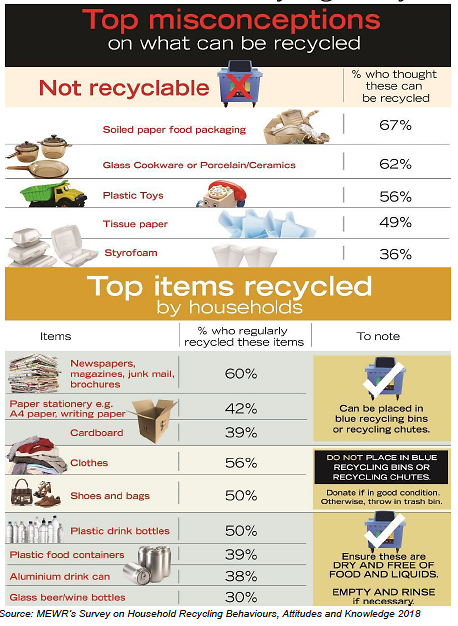SINGAPORE: Can plastic toys, clothes and glass pots be recycled? If you say yes, you’re not alone, but these items do not belong in a recycling bin, according to authorities.
Around 60 per cent of Singapore households recycle regularly, but many still find it difficult to identify contaminants and non-recyclables, surveys conducted by the Ministry of the Environment and Water Resources (MEWR) and the National Environment Agency (NEA) have found.
The two surveys, which were conducted between June 2018 and February 2019, covered different aspects of household recycling, said the agencies in a joint media release on Monday (Apr 29).
READ: 7 in 10 people in Singapore do not know what plastics to recycle: SEC report
READ: Singapore shoppers take 820 million plastic bags from supermarkets each year
According to the findings, the top items recycled were paper materials like newspapers, magazines, junk mail, brochures and writing paper.
Clothes, shoes and bags were also among the top items recycled. However, these items should be donated – if in good condition – instead of being recycled, said the agencies.
“These wrongly recycled items contribute to the high contamination rate of the recyclables collected from the blue recycling bins,” said MEWR and NEA.
Another category of items which were also regularly recycled were plastic drink bottles, aluminum cans and glass beer/wine bottles.
“While these items can be recycled, they should be emptied and rinsed clean wherever possible,” reminded the agencies.
The most common channel used for recycling was the blue recycling bins, with 56 per cent of regular recyclers using the bins at least once a week, the findings showed.
Convenience was one of the most commonly cited reasons for those who recycled regularly, according to MEWR’s survey.
NEA’s survey also found that this group of households found recycling to be “second nature” and part of their daily routine.
67% THOUGHT SOILED FOOD PACKAGING CAN BE RECYCLED
Even though the findings showed that respondents were generally capable of identifying recyclable items, they had difficulty identifying contaminants and non-recyclables, said MEWR and NEA.
According to MEWR’s survey, 67 per cent of respondents thought that soiled paper food packaging can be recycled, while another 62 per cent thought that glass cookware or porcelain/ceramics can be recycled.
READ: Commentary: Recycling makes you feel less guilty but doesn’t change how huge our plastic problem is
READ: Commentary: Why recycling, less single-use plastics are not the answers to our plastic scourge
Other items that were wrongly identified as recyclables were plastic toys, tissue paper and Styrofoam.

Top misconceptions of what can be recycled. (Table: MEWR)
Around 60 per cent of respondents also mistakenly thought that recyclables had to be sorted by type before being deposited into recycling bins, said the agencies.
“There is no need to pre-sort items that are deposited into the blue recycling bins, because the contents of the blue recycling bins will be transported to the MRF (Material Recovery Facilities) where the sorting takes place.”
TOO BUSY, INCONVENIENT TO RECYCLE
As for households who did not recycle regularly, the most common reasons were related to convenience.
Some of the reasons included having too few items to recycle, being too busy or tired, as well as not having enough space to accumulate recyclables in their homes.
READ: The monstrous scale of plastic bag wastage in Singapore
READ: “Cannot sell … so they burn” – what’s next in the uncertain future for plastic waste in Singapore?
“Barriers cited by households who did not recycle regularly suggest that recycling was perceived as inconvenient and secondary in their daily routine,” said the agencies.
“Hence, helping Singaporeans to see that recycling is easy and helping with habit formation are important in improving Singapore’s household recycling rate.”
In 2017, it was announced that dual chutes for refuse and recyclables will be installed at all new non-landed residential developments.
All new Build-To-Order Housing and Development Board flats have installed recycling chutes adjacent to centralised refuse chutes at every level since January 2014.
This requirement has also been extended to buildings taller than four storeys in all new non-landed private residential developments since Apr 1 last year.
For the two surveys, MEWR and NEA surveyed 2,003 and 3,445 randomly-selected households respectively through face-to-face interviews.




